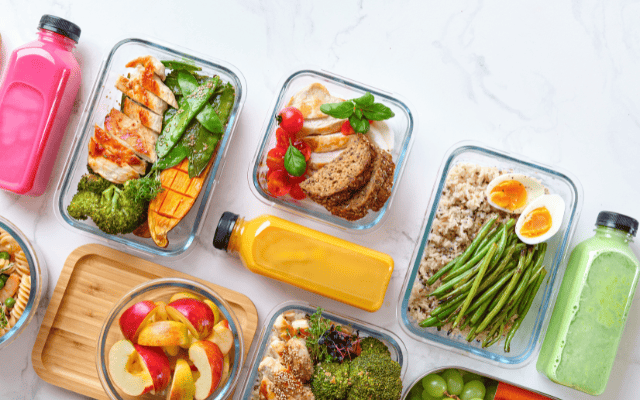Maintaining a healthy lifestyle starts with a well-balanced diet filled with Nutrient-Packed Meals. The right combination of vitamins, minerals, and macronutrients plays a crucial role in boosting energy levels, improving digestion, and strengthening the immune system. By incorporating Nutrient-Packed Meals into your daily routine, you can enhance overall well-being and prevent various health conditions.

Creating a healthy food plan involves selecting wholesome ingredients that provide essential nutrients. Understanding the benefits of Nutrient-Packed Meals can help you make better food choices. This guide will explore how to structure a meal plan that supports optimal health while ensuring delicious and satisfying meals.
Understanding Nutrient-Packed Meals
What Makes a Meal Nutrient-Packed?
A Nutrient-Packed Meal contains a variety of essential nutrients, including protein, fiber, healthy fats, vitamins, and minerals. These meals provide sustained energy, improve digestion, and help maintain a healthy weight.
Whole foods such as vegetables, fruits, lean proteins, and whole grains contribute to Nutrient-Packed Meals. By avoiding processed foods and excessive sugars, you can ensure that your diet is rich in nutrients that support your body’s needs.
The Importance of Balanced Nutrition
A well-balanced diet is essential for maintaining overall health. Nutrient-Packed Meals ensure that the body receives all the necessary nutrients in the right proportions, leading to improved metabolism and better organ function.
By focusing on nutrient-dense foods, you can avoid deficiencies and support long-term health. Incorporating a variety of foods ensures that your body gets the proper nourishment needed for optimal performance.
Building a Healthy Food Plan
Choosing the Right Ingredients
Selecting high-quality ingredients is the foundation of Nutrient-Packed Meals. Fresh vegetables, lean proteins, whole grains, and healthy fats should form the core of your diet.
Avoiding artificial additives and processed foods can significantly improve the nutritional value of your meals. Opt for organic and locally sourced ingredients to maximize health benefits.
Meal Preparation and Planning
Planning meals in advance ensures that you consistently consume Nutrient-Packed Meals. Preparing meals at home allows you to control portion sizes and avoid unhealthy additives.
Batch cooking and meal prepping can help save time while maintaining a nutritious diet. Preparing balanced meals ahead of time reduces the temptation of unhealthy food choices.
Essential Nutrients for a Healthy Diet
Proteins and Their Role in Health
Proteins are essential for muscle repair, immune function, and overall body strength. Nutrient-Packed Meals that include lean meats, fish, eggs, and plant-based proteins like lentils and beans contribute to a healthy diet.
Consuming adequate protein helps maintain satiety and energy levels throughout the day. A balanced protein intake also supports metabolism and muscle maintenance.
The Importance of Healthy Fats
Healthy fats are crucial for brain function, heart health, and overall well-being. Nutrient-Packed Meals should contain sources of healthy fats, such as avocados, nuts, seeds, and olive oil.
Incorporating unsaturated fats into your diet helps reduce inflammation and supports cellular function. Avoiding trans fats and overly processed oils is essential for maintaining good health.
Creating a Weekly Meal Plan
Breakfast Ideas for a Nutrient-Packed Start
Starting the day with Nutrient-Packed Meals ensures sustained energy and better concentration. A healthy breakfast can include oatmeal with fruits, Greek yogurt with nuts, or whole-grain toast with avocado.
Adding protein-rich options such as eggs or smoothies can enhance the nutritional value of your breakfast. A nutrient-dense morning meal sets the tone for a productive day.
Lunch and Dinner Options for Balanced Nutrition
Lunch and dinner should include a balance of protein, fiber, and healthy fats. Nutrient-Packed Meals like grilled chicken with quinoa, vegetable stir-fry, or salmon with roasted vegetables are excellent choices.
Incorporating leafy greens, whole grains, and legumes into meals ensures adequate nutrient intake. Keeping portion sizes in check helps maintain energy levels without overeating.
Healthy Snacking and Hydration
Nutritious Snack Choices
Snacking on healthy foods can keep hunger at bay and provide essential nutrients. Nutrient-Packed Meals should include snacks like nuts, seeds, hummus with veggies, and yogurt.
Avoiding processed snacks with high sugar and salt content helps maintain stable blood sugar levels. Choosing whole foods for snacking supports long-term health.
Staying Hydrated for Optimal Health
Hydration is a crucial part of a healthy diet. Nutrient-Packed Meals should be complemented with adequate water intake throughout the day.
Drinking herbal teas, infused water, and fresh juices can provide hydration and additional nutrients. Avoiding sugary drinks and excessive caffeine supports overall well-being.
Conclusion, Incorporating Nutrient-Packed into your daily routine is essential for maintaining overall health and wellness. A balanced diet rich in essential nutrients supports digestion, metabolism, and energy levels.
By selecting wholesome ingredients, planning meals in advance, and making mindful food choices, you can create a sustainable healthy eating plan. Start today by embracing Nutrient-Packed and experience the benefits of a well-nourished body and mind.